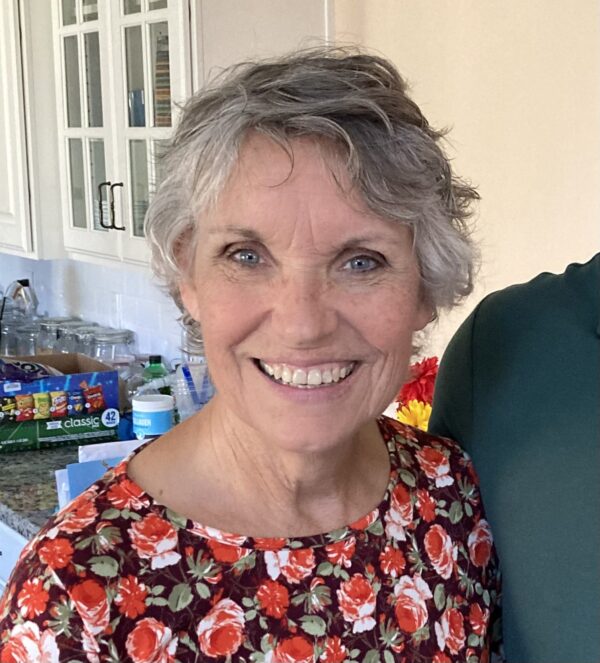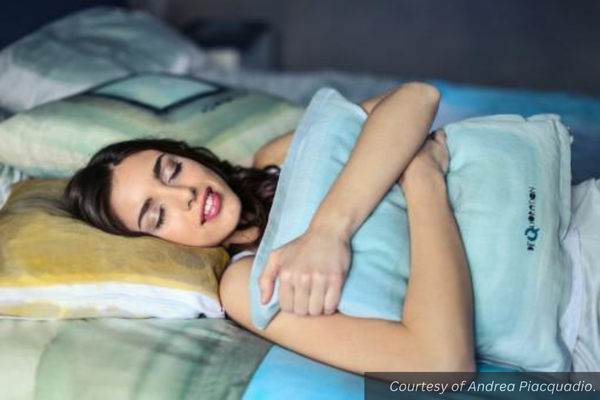“Sleep” is part of a monthly column of mental health articles by Karen Munson. Read the previous month’s article, “Cold Showers,” at the link.
Sleep is essential for everyone, but it is especially healing for anyone who has been traumatized.
According to Wayne Giles, M.D., Director of CDC’s Division of Population Health, “Lifestyle changes such as going to bed at the same time each night; rising at the same time each morning; and turning off or removing televisions, computers, and mobile devices from the bedroom, can help people get the healthy sleep they need.”
Trauma and being sleep-deprived puts victims at higher risk for anxiety and depression. Learning what their body is doing is the first step to recognizing what is going on and why they are responding the way they are.
Knowing that elevated cortisol was affecting her sleep helped writer Carly Lanning step back and distance herself from the problem. She wasn’t illogically creating the lack of sleep. There were logical reasons, affirming that she was indeed normal and there was an answer and approach. She came to understand that healing was not linear, but “an ongoing process of caring for yourself” and taking care of the effects of the experience.
She continues, “What makes sleep so vital for everyone, but especially for trauma survivors, is that it helps the body process and rejuvenate.”
When a person is traumatized, their body is flooded with stress hormones including cortisol, adrenaline, and norepinephrine. These hormones trigger the sympathetic nervous system to respond with fight, flight, or freeze. Heart rate and breathing are increased and senses are heightened.
While there are some things you can’t control, there are many that you can do that will lower your heart rate and breathing and increase your likelihood of getting the rest you need.
- Just as you have a morning routine, creating a bedtime ritual is another great hack to bookend the day. Surprising to some, the morning routine affects the nighttime sleep. Within an hour of waking up, look at natural sunlight for a minimum of two minutes.
- A study called the Physiology of the Pineal Gland and Melatonin published in the National Library of Medicine, states, “Light exposure is the most important factor related to pineal gland function and melatonin secretion.” The circadian rhythm of the pineal gland is activated through light and signals it to release melatonin, a sleep hormone, in 14-16 hours.” Screen light does not take the place of natural light.
- Being physically active during the day will increase the likelihood of a good night’s sleep.
- Avoid caffeine after lunchtime and finish supper at least two hours before retiring. If you are hungry before bedtime, eat a light snack.
- Brain Dump – record your to-do list, projects, concerns, people to contact, purchases, agendas, itineraries, et cetera into a notebook or day planner. Get it out of your head and written down where you can access it the next morning when you jump into your day. Let it go: release it from your conscious mind. It will wait for you until tomorrow.
- Reflect on what you are thankful for. You could count your many blessings and/or write in a gratitude journal. In studies published in the National Library of Medicine and the Journal of Psychosomatic Research, subjects who practiced gratitude improved their sleep quality and duration.
- Unplug from electronics two hours before going to bed. According to the National Sleep Foundation, blue light exposure can be disruptive to one’s sleep cycle because it stimulates the brain into thinking it’s earlier in the day. Your brain slows or stops its release of melatonin, making it harder to fall asleep. Additionally, games and the internet can be highly stimulating. Avoid elevated emotional states that might prevent you from falling asleep quickly.
- Take a warm shower. This cools off your body internally which makes it easier to fall asleep.
- Use essential oils such as lavender to help calm the mind and relax the body. They can be applied to the body or used in diffusers or sprays. For an extensive list of individual oil strengths and characteristics see “13 Best Essential Oils for Sleep – How to Use & Risks” on nectarsleep.com.
- Make your room peaceful. Look at the atmosphere of the room. Consider adding relaxing art and cozy bedding. Perhaps a night light will be a nice functional accessory.
- You might also research Feng Shui, an ancient Chinese art of creating peaceful atmospheres to see which way to orient your bed for optimal sleep.
- Three of the main things that keep us awake or wake us up in the night are light, noise, and temperature.
- Creating a calming atmosphere with dim lights or even blackout shades can help.
- A white noise machine can block out unwanted disturbance, or, as one life coach did, move your bedroom to a quieter place in the house, such as away from a busy street, if that is an option.
- Keeping your bedroom temperature cool while you snuggle under warm covers is also recommended.
- Practice Meditation – You may want to search specifically for a trauma-informed meditation app or find a practitioner. But any kind of meditation can help you learn to slow your breathing and begin the relaxation process. If it doesn’t feel safe to close your eyes, simply lower your gaze.
- Zahabiyah Yamasaki, M.Ed, a yoga instructor, guides her students, “You might explore resting a palm on your heart and a palm on your belly. If it feels okay, explore turning the volume of your heart all the way up and the volume of your thoughts all the way down. Focus on the beating of your heart and the rhythm of your breath.”
- Breathwork, such as Wim Hof’s, oxygenates the body and relaxes the mind while releasing stress and worry. He offers a free app where he guides the listener through different breathing patterns.
Going to bed at the same time each night cues your body’s clock that it is time to relax and get that rest you want. We all need sleep. Most of us require seven to nine hours of sleep for optimal effectiveness throughout the day. Minor changes in your sleep routine can provide a great return in mental and emotional health.
– by Karen Munson

Karen M. Munson – Escalante
Karen is an associate editor at The Byway. She is fascinated and fulfilled by all things involved with writing. After graduating from BYU, she taught English at Escalante High School for three years. She pursues opportunities to write and support others in their writing. Karen has published three books with four more scheduled to be released in 2024. She and Reed are the parents of ten children and the grandparents of 35 grandchildren.
Karen is the author of the New Twist on Mental Health column in The Byway.

